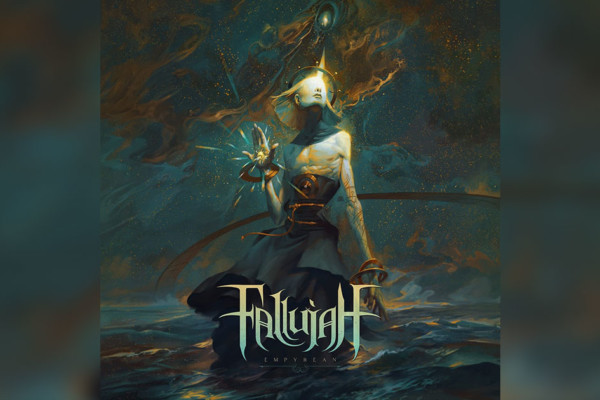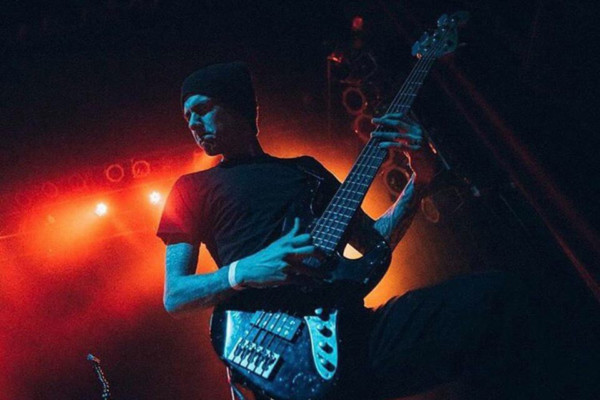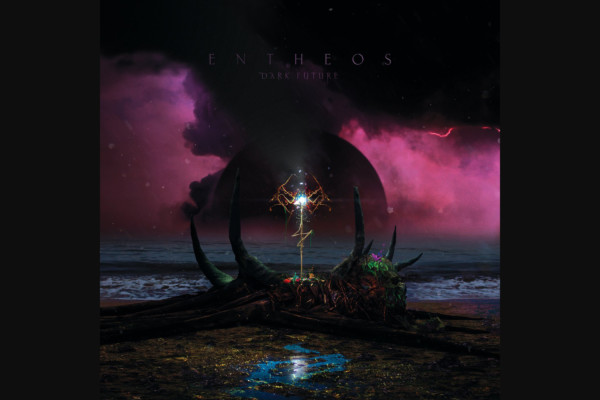Entheos: An Interview with Evan Brewer
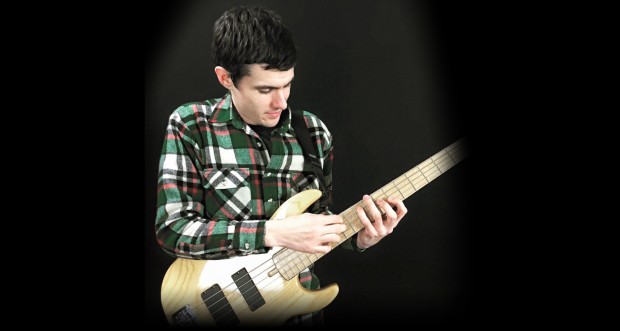
After dropping their Primal EP last year, Entheos is returning with their full-length release The Infinite Nothing on April 1st. The band – comprised of singer Chaney Crabb, guitarist Malcolm Pugh, drummer Navene Koperweis and bass wizard Evan Brewer – have spent the year refining their sound in the studio and on the road.
Brewer’s top notch bass work is a key aspect to the band’s sound. His perfectly crafted lines and biting tone cut through the mix to complete the music, which is not always an easy in a heavy metal format.
We reached out to Brewer to get the scoop on the new album, making your bass heard in a heavy setting, his gear, and how to write the best bass lines.
I’m really digging the album… It has a nice flow with the intros and outros to make it a full listening experience.
That’s [because of] our drummer Navene [Koperweis]. That’s his doing. He’s like an electronic music producer, so to have that in our back pocket enables us some stuff that a lot of metal bands don’t have access to.
How did the band come together?
I had decided that I’d run my course with The Faceless [in 2014]. I felt like everything that was going to happen with that project had already happened. To stay involved with something, I need to feel like we’re going somewhere. That’s how I stay excited. So I stepped away from that. I was just going to work on my solo stuff and try to do some more jazz fusion type stuff to take a break from the heavy music thing. But I got a call from Navene, and he had done the same thing I did. He stepped away from Animals As Leaders to pursue electronic music. Both of us are the same in that we love metal, but we have much more going on [musically] than just metal. We’re not going to be fulfilled by just a metal band.
He had come around to deciding that he had been away from the metal genre long enough and wanted to start something up. We had been in a band called Animosity previous to this band. So he asked me if I wanted to be a part of it, and I did. Even though I didn’t get quite the break I expected to from the metal genre, I have love for metal so I was open to it. I didn’t know it was going to be everything it turned into, but I agreed to do it and it went from there.
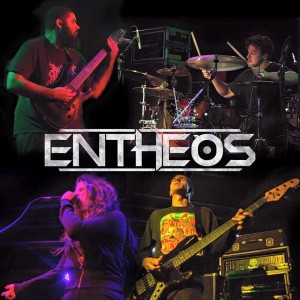
It seems to have really taken off.
It’s definitely a little bit faster than what I expected. I thought, “Ok, I’ll go to California and it will give us an excuse to hang out. We’ll write and record an EP and we’ll just put it out for people to listen to.” Now it’s turned into a full-time band, which is interesting.
What’s the story behind the name?
Yeah… I wasn’t a huge fan of the band name because I want a band name to be something that people will know what it is after they hear it one time, and they’ll be able to repeat it. Entheos
has been misunderstood. Just about every variation you can imagine, I’ve heard. I didn’t come up with it, the other members did, but the name grew on me after I did a little research. It’s Greek for “to be full of inspiration,” and I like that.
When I read the meaning, I figured that would be up your alley.
I just wanted something that people would understand without a misunderstanding or misspelling. But on the other side of that, in 2016 almost about every band name you could possibly think of has been taken not just once, but four and five times. You have to almost go with something weird to even have a name.
You talked about a lot of different musical influences, and I read a statement by Navene calling the music “Death Fusion.” Do you agree with that?
I don’t agree with that necessarily. I like to just think of it as heavy metal.
How has the band changed since you released the EP last year?
[We’ve changed] in a number of ways. I think the hardest part about starting a new project is figuring out what you want to do. What do we want to sound like? Where do we want to go? So the EP was really a means for us to cut our teeth and lay a little bit of foundation. We didn’t want to overthink it so we really made the EP very quickly.
The album is definitely a continuation of what started out in its infancy in the EP. I like to tell people that if you heard the EP and you liked it at all, you’re going to love the album because all the things that the EP has are in the album, but there’s new flavor and everything has been elaborated on much more extensively. We never really stopped the writing process. We made the EP and went straight into writing the album. Somehow the album still has a more evolved sound, to me. We called the EP Primal, which is fitting for a number of reasons, but it was a raw and primal version of what is now the full length album, which is a more sophisticated and mature sound. It’s weird to say because there was no real gap in the writing process, but that’s how I feel about it.
The band is about inspiration, and I know you’re an avid reader. What kind of things were you reading during the making of the album?
I’m always reading non-fiction of various topics. I like to go up to my bookshelf and randomly grab a book and I’ll read a paragraph or two just to continue my education. I’m always reading my music theory books and working on it. At least once a week I’ve got to get into some kind of advanced harmony or jazz theory just to chip away at it, knowing that it’s a life-long educational process. As far as fiction goes, I’ve been completely obsessed with “A Song of Ice and Fire” by George R.R. Martin.
Listening to the album, your bass has a ton of cut. How do you get your tone to shine through on such dense soundscapes?
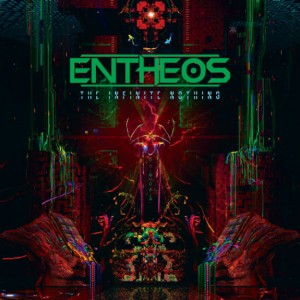 That’s a great question. It’s an ongoing struggle for bass players in heavy music. I’ve always felt that of any genre it’s the hardest for the bass to function on its own sonic plane. There’s two schools of thought, one of which can be seen with my playing in The Faceless, where you use a more traditional, smooth style tone and fingerstyle, focusing on getting the low mids. It might not necessarily be the low mids, but you find the magic mid-range frequency that helps you pop out. That’d be what I call “smooth style” of playing over metal.
That’s a great question. It’s an ongoing struggle for bass players in heavy music. I’ve always felt that of any genre it’s the hardest for the bass to function on its own sonic plane. There’s two schools of thought, one of which can be seen with my playing in The Faceless, where you use a more traditional, smooth style tone and fingerstyle, focusing on getting the low mids. It might not necessarily be the low mids, but you find the magic mid-range frequency that helps you pop out. That’d be what I call “smooth style” of playing over metal.
In this band, going into it they said, “We really want you to do your more solo-type slapping approach in metal.” It’s something I had not really been able to do yet. So, in this band it’s different and cutting through really relies on who is producing the music, I think. We keep all of our production stuff in house so it’s a very controlled process, because Navene and I are working on the tones: me with the pre-production of what’s going to tape and him with the post-production. He’s able to say, “I want to hear the bass,” and then actually care and put the effort in to make sure it happens. Another part of the equation is the equipment.
What did you use for recording?
The equipment that we’ve used and the signal paths have been very simple for the EP and the album. On the album, I really just wanted to go back to the old school way so I used the same SansAmp pedal I’ve had since ’97… just straight in. The most important part of any bass signal path is going to be two things: the player and the tone from his hands, and the bass that he’s using.
I’ve been ecstatic about the bass I’m using with the band, which is a Sandberg TM5. I can’t necessarily vouch for all [Sandberg] basses because I’ve had limited exposure to them, but this bass is special for this band. It’s got a jazz pickup and a MusicMan pickup in the bridge, which I’ve always been a fan of, but something that was surprising for a slap tone is that it’s got an ebony fretboard. Normally, I’d never want to play a slap bass tone with an ebony board. That’s a little too harsh for me. But something about the way it’s balanced with the electronics makes it very even and not harsh and pingy. It’s got a hardwood characteristic with good sustain and evenness over the whole fretboard, but it doesn’t have abrasive high end. It’s also a 35-inch scale, and we play in drop A. Having to drop that low string really sucks on a 34-inch… it’s hard to get it as tight as you would like. While the 35-inch scale is a little tougher on the left hand, it makes it where I can actually get a decent low A.
I think all those things contribute to getting that tone to really pop out. Then, just trying to really make sure I’m playing very specific things that are well rehearsed and playing them clearly. That’s important, too.
When you’re writing this kind of stuff, there’s so much going on in the song but you’re still able to get your voice in there. How do use that? It seems like you pick the perfect places to stick in a double stop or a little run. Do you have a formula for that or do you just try to be as creative as possible?
A lot of it is trial and error. One great thing about having a lot of right hand technique is that I can try things a number of different ways when I’m just at home writing. Most of these riffs start out with a guitar part and then I’m gonna write my bass parts to that guitar riff.
First of all, I don’t worry about trying to match the guitar. A lot of stuff is halved. If the guitar is playing 16th notes, I’m playing 8th notes. I might play the exact same notes, but I’ll switch up the octave. That’s a great trick for metal. If he’s playing a line that goes low, I might play the same notes but rework them to where I’m ascending now. A lot of times there’s no harmonic definition as in, “This is a dorian riff so anything I play in A Dorian is going to work.” It’s not like that. It’s a lot of chromaticism and riff-based stuff, so you don’t have the luxury of just going off scalar tangents. You have to match what’s going on but alter the fingerings and octaves.
A lot of times I’ll take a guitar riff and switch it into slap bass. That’s one of the most challenging things to do. Another thing I do, and this may seem weird due to the technicality of the music, is I think of it more as a heavyweight boxer laying knockout punches versus a featherweight guy hitting you with a ton of little quick punches. The bass needs to be rounded down. I’m trying to figure out, “Ok, what is this riff saying and how can I round it down to make a big huge bass line out of it?” It needs to be huge and heavy if it’s heavy metal. I want it to be less like a machine gun and more like a shotgun blast, if that makes sense.
So it’s like distilling down to the essence of the riff and then expounding on that.
Yeah, and that can be hard. Sometimes I’ll reach out to the guitar players and say, “I see what you’re doing, but let’s talk about what you would do if you were to round it down,” then I’ll get that as a starting point. Another thing that’s great is collaborating with the drummer on some of the rhythmic stuff. That’s why I like recording with Navene because he has a full understanding of every little thing that’s happening on the drums. He’ll say, “Did you notice this thing where the ride is hitting the bell on this rhythm?” And I’ll say, “Wow, I really didn’t even notice that. Let’s work off of it.” So we’ll get cool syncopations and stuff.
It’s one thing to have the credit of saying I write all the bass myself, but I don’t really care about that. I’ve found that I get better results if I reach out to other band members and we sort of collaborate on stuff.
That’s interesting, because I think that’s not just a matter of metal. Players in every genre want to take this ownership of their lines, but it’s really about creating the best bass line.
I think so. However you get there is however you get there. Really, at the end of the day, just because he gives me a little idea, I’m still the one that’s got to execute that on the bass and I’m still the one that has to turn that into a bass line. I’m the bass player, so there’s ownership built in. Set the ego aside a little bit. I think you’ll often find that by doing that you’ll get outside of your rut, niche-type, easy-fingerings and licks and you might get to something that might inspire you.
You recently posted a playthrough of your song “Cause For Concern.” Does that mean we can expect more solo work?
I have a little bit of stuff in the works, but I’m not in a huge hurry. It will definitely happen eventually. That’s something that I’m going to be doing as long as I’m playing and as long as I’m alive. I want to make sure every album is significantly different. If you listen to the first one and then listen to the second one, they’re different because I’m focused on different stuff as a player, but I’m also approaching it from a whole other set of instrumentation. I want to continue to do that.
I have a desire to make an all organic solo album with a lot of brush work and real acoustic drums. I want the bass to be less layered where we just go into a studio and perform everything in real time. I don’t have a desire to make Your Itinerary 2 or Alone 2, you know? I want to make sure I have something else to say. I want to continue making each album different, but that takes time. I’m still working on getting better and just evolving as a player, so I want to give that some time before I get into another one.

